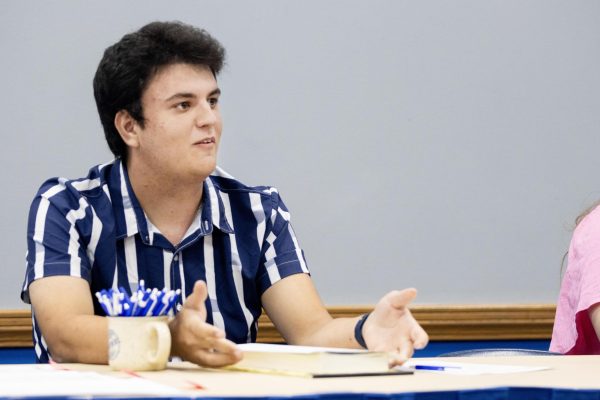The Senate validated the projected executive positions Friday, no changes were made.
The new Student Body President Nidhi Patel, a senior finance major, won uncontested with 325 votes, Executive Vice President August Biernbaum, a senior political science major, won uncontested at 325 votes, Brianna Hull-Dennis, a senior political science major, won against Nicholas Macaluso, a senior management major, 251-92 for the vice president of student affairs, and Vice President of Academic Affairs Carlos Rodriguez, a sophomore English major won uncontested with 321 votes.
Patel’s main three goals for her term are to build upon preexisting mental health resources on campus, continue to further diversity and promote technology uniformity. In addition to these goals, she wants to make efforts to encourage more students to come to Eastern.
“It’s such a great school and I think people don’t know about it, so I hope to get connected with more networks and high schools all over the country to be able to recruit more students,” Patel said. “I’m just excited to start pursuing my role.”
Similarly to Patel, Biernbaum can not sit still. He plans to revive several programs through Student Government like the Student Action Team, Senate-on-the-Go, have the Senate go on a tour of the state capitol building, be involved with the Charleston community and eventually host a workshop for surrounding schools’ Student Government Association.
“We’re gonna hit the ground running this year,” Biernbaum said.

The new executive board and six senators will be sworn in during Wednesday’s Student Government meeting.
Retention has been a problem for the past two years according to former student body president Lucy Ade, a senior interpersonal communication major, since she was speaker of the senate in fall of 2021.
Current speaker of the Senate, Karolina Guzek, a junior political science major, spent the last five months planning and preparing for the start of semester to start recruiting potential senators. Ade stepped in to help advise her along the way.
“It’s Karolina, I want to push it way more to Karolina,” Ade said. “I love to advise but this was really Karolina’s success. She handled all of Student Government Week and I helped [plan] Pantherpalooza and then came in to help out some.”
Ade said the problem was never recruitment, it was retention, but seeing the new phase of the Senate is exciting for her.
“It was really sad to see what [the Senate] looked like as it was slowly shrinking,” Ade said. “I’m excited for the Student Senate, I’m excited for the new executive committee.”
That lack of interest appears to have faded out because the Senate inducted 11 new senators last Wednesday during the unofficial elections results.
Last semester, the Senate only met quorum three times. It hit its first official meeting in early April then sustained quorum up until the end of the year for two more meetings.
During the official meetings the Senate approved a bylaw changing the quorum and the amount of students one senator represents.
Originally, 300 fully enrolled students counted for one seat, but after the change each seat represented 800 students with the minimum amount to meet quorum being 11 instead of 15.
When the Senate does not meet quorum, it is unable to conduct official business like the approval of any new student organizations, pushing through legislature, the allocation of funds or the appointment of members to committees.
Guzek said although things look hopeful, she plans to keep the quorum low to ensure the group will continue to meet quorum even if some senators do not return like in years past.
“As of right now, I’m going to keep [the quorum] at 11 as a safeguard for future speakers in case they encounter the same problem,” Guzek said.
The Speaker wants to keep the senator cap at 20 and will be requiring all senators to pass some kind of legislation.
“The Senate is definitely reenergized,” Guzek said. “I’m glad to see all of our hard work paid off.”
Rob Le Cates can be reached at 581-2812 or deneic@gmail.com.

















![[Thumbnail Edition] Senior Foward Macy McGlone, getsw the ball and gets the point during the first half of the game aginst Western Illinois University,, Eastern Illinois University Lost to Western Illinois University Thursday March 6 20205, 78-75 EIU lost making it the end of their season](https://www.dailyeasternnews.com/wp-content/uploads/2025/03/WBB_OVC_03_O-1-e1743361637111-1200x614.jpg)



















































![[Thumbnail] Eastern's Old Main was quiet Thursday morning while educators who had left the office to strike picketed outside.](https://www.dailyeasternnews.com/wp-content/uploads/2025/04/Strike_01_LT_O-800x1200.jpg)




